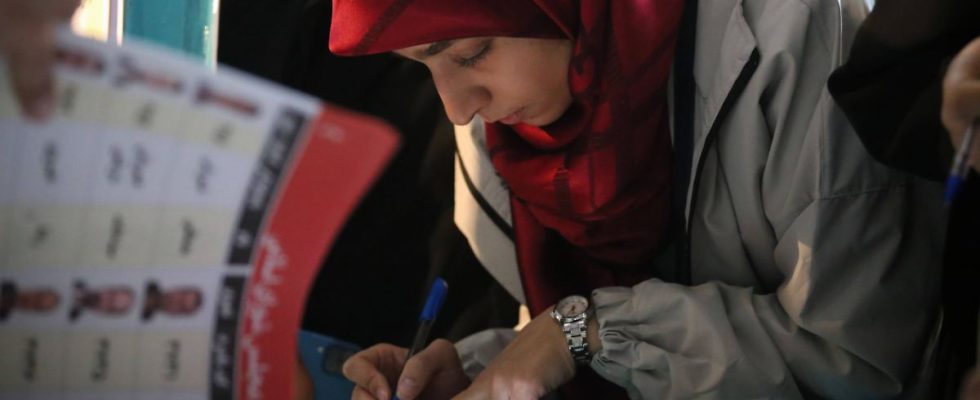Despite calls from the state leadership
Voter turnout in Iran is probably worse than ever
March 2, 2024, 1:00 a.m
Listen to article
This audio version was artificially generated. More info | Send feedback
One and a half years after the start of the latest protest movement, a new parliament and the Council of Experts are being elected in Iran. Many critical candidates are not admitted. Observers are more interested in another question than the result.
After a four-hour extension, the elections in Iran ended without major incidents. The nearly 60,000 polling stations nationwide were open from 8 a.m. to midnight local time (5:30 a.m. to 9:30 p.m. CET). The first results are expected this weekend. State media said schools will be closed on Saturday, the start of Iranian Week, because of the delay. The state leadership had been promoting the elections for weeks. Observers are more interested in the question of how low voter turnout would be this time than the result.
According to an initial report, it was around 41 percent. According to the pro-government Fars news agency, around 25 out of 61 million eligible voters cast their votes. The information cannot be independently verified. It would be the lowest voter turnout in the history of the Islamic Republic after 42.6 percent in the 2020 parliamentary election. The population was called upon to decide on a new parliament (Majles) and the Council of Experts, an influential body of Islamic clerics. Numerous critical candidates were excluded before the vote by the so-called Guardian Council.
The camp of reform politicians is extremely weakened, so that now it is mainly conservative forces fighting for power. These are the first elections after the women-led protests in autumn 2022. Well-known activists, including the imprisoned Nobel Peace Prize winner Narges Mohammadi, had called for a boycott.
In the snowy north of the capital Tehran, few wanted to give their opinion on the votes. “These elections are just a facade and have no impact on the future of the country,” complained a young barista. “The economic situation is getting worse every day,” he added. A 27-year-old woman made similar comments. She used to vote, but not anymore. “The repression of people during the protests had a negative impact on voter turnout,” she said. In the conservative south of the capital, more people are going to the polls. “Voting is a religious obligation,” said one 23-year-old. “I just hope that the politicians don’t disappoint us.”
State leaders drummed up support for the elections
The political system of the Islamic Republic has combined theocratic and republican elements since the 1979 revolution. The 290 seats in parliament, five of which are reserved for religious minorities, are elected by the people every four years. The so-called Guardian Council, an ultra-conservative control body, decides on the ideological suitability of politicians. As a result, citizens can usually only choose from a group of candidates who are loyal to the system. For example, the Guardian Council excluded 5,000 applicants. Nevertheless, a record number of 15,000 Iranians are running. Candidates do not enter the race with parties, but rather organize themselves through lists.
The head of state is unlikely to be indifferent to the elections, as recent statements from top politicians and religious leader Ayatollah Ali Khamenei attest. They urged the nation to take part in the voting. As chairman of the Council of Experts, Khamenei is also the actual leader of Iran, above the president, who, as head of government, appoints ministers. The Council of Experts is elected directly by the people every eight years; the body includes 88 Shiite clergy who determine the successor to the religious leader in the event of his death. Khamenei will turn 85 in April. 144 candidates are approved for the council. The low number was justified by strict theological requirements. Before the elections, the disqualification of moderate former President Hassan Ruhani, who has been a member of the Council of Experts for more than 20 years, caused criticism.
In addition to the Council of Experts and the President, the Security Council also has extensive powers. Iran’s elite military force, the Revolutionary Guards (IRGC), has expanded its influence at all levels in recent decades and has become an economic empire.

